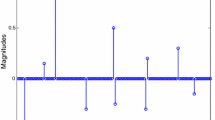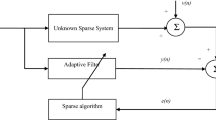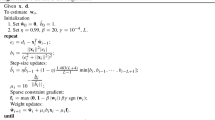Abstract
A novel sparse LMS algorithm for the sparse system identification is proposed to reduce the complexity of the existing algorithms. The proposed algorithm discards W(n) when the value of the current weight vector is within a certain range. The algorithm also optimizes the iterative update equation by using only the product term to calculate the value of W(n+1). The hardware implementation shows that the total logic elements number of the proposed algorithm is 60.06% less than the latest l0-ILMS algorithm, while the performance is nearly the same.


















Similar content being viewed by others
Data Availability
The data used to support the findings of this study are available from the corresponding author upon request.
References
F. Albu, J.M. Liu, S.L. Grant, Approximated proportionate affine projection algorithms for block-sparse identification. In: 2016 13th International Conference on Electrical Engineering/Electronics, Computer, Telecommunications and Information Technology (ECTI-CON), 1–4 (2016)
F. Albu, J.M. Liu, S. L. Grant, A fast filtering block-sparse proportionate affine projection sign algorithm. In: 2016 International Conference on Communications (COMM), 29–32 (2016)
Y. Chen, Y. Gu, et al., Sparse LMS for system identification. In: 2009 IEEE International Conference Acoustic Speech and Signal Process. (ICASSP’09), pp. 3125–3128 (2009)
B. Farhang-Boroujeny, Fast LMS/Newton algorithms based on autoregressive modeling and their application to acoustic echo cancellation. IEEE Trans. Signal Process. 45(8), 1987–2000 (1997)
Y. Gu, J. Jin, S. Mei, l0-norm constraint LMS algorithm for sparse system identification. IEEE Signal Process. Lett. 16(9), 774–777 (2009)
B. Jovanovic, R. Jevtic, C. Carreras, Binary division power models for high-level power estimation of FPGA-based DSP circuits. IEEE Trans. Ind. Inform. 10(1), 393–398 (2014)
J. Liu, B. Weaver, Y. Zakharov, FPGA implementation of multiplication-free complex division. Electronics Lett. 44(2), 95–96 (2008)
L. Luo, A. Xie, Steady-state mean-square deviation analysis of improved l0-norm-constraint LMS algorithm for sparse system identification. Signal Process. 175 (2020)
W.F. Schreiber, Advanced television systems for terrestrial broad-casting: some problems and some proposed solutions. IEEE Proc. 83(6), 958–981 (1995)
K. Shi, P. Shi, Convergence analysis of sparse LMS algorithms with l1-norm penalty based on white input signal. Signal Process. 90(12), 3289–3293 (2010)
G. Su, J. Jin, Y. Gu, J. Wang, Performance analysis of l0 norm constraint least mean square algorithm. IEEE Trans. Signal Process. 60(5), 2223–2235 (2012)
H. Suzuki, T.V.A. Tran, I.B. Collings, G. Daniels, M. Hedley, Transmitter noise effect on the performance of a MIMOOFDM hardware implementation achieving improved coverage. IEEE J. Select. Areas Commun. 26(6), 867–876 (2008)
F.Y. Wu, F. Tong, Non-uniform norm constraint LMS algorithm for sparse system identification. IEEE Commun. Lett. 17(2), 385–388 (2013)
F.Y. Wu, F. Tong, Gradient optimization p-norm-like constraint LMS algorithm for sparse system estimation. Signal Process. 93(4), 967–971 (2013)
X. Zou, F. Tao, P. Jiang et al., A new approach for data processing in supply chain network based on FPGA. Int. J. Adv. Manuf. Technol. 84(1–4), 249–260 (2015)
Acknowledgements
This work is supported by the Chongqing Scientific Project under grant No. cstc2021ycjh-bgzxm0085, No. cstc2019jscx-msxmX0079 and No. cstc2021jscx-rhcxzy0042. The authors thank Mr. Xiaodong Ma for his help of hardware implementation assistance.
Author information
Authors and Affiliations
Corresponding authors
Ethics declarations
Conflicts of interest
To the best of our knowledge, the named authors have no conflict of interest, financial or otherwise.
Additional information
Publisher's Note
Springer Nature remains neutral with regard to jurisdictional claims in published maps and institutional affiliations.
Rights and permissions
Springer Nature or its licensor holds exclusive rights to this article under a publishing agreement with the author(s) or other rightsholder(s); author self-archiving of the accepted manuscript version of this article is solely governed by the terms of such publishing agreement and applicable law.
About this article
Cite this article
Meng, J., Zhang, H., Yi, S. et al. A Low-Complexity Sparse LMS Algorithm Optimized for Hardware Implementation. Circuits Syst Signal Process 42, 971–995 (2023). https://doi.org/10.1007/s00034-022-02152-x
Received:
Revised:
Accepted:
Published:
Issue Date:
DOI: https://doi.org/10.1007/s00034-022-02152-x




